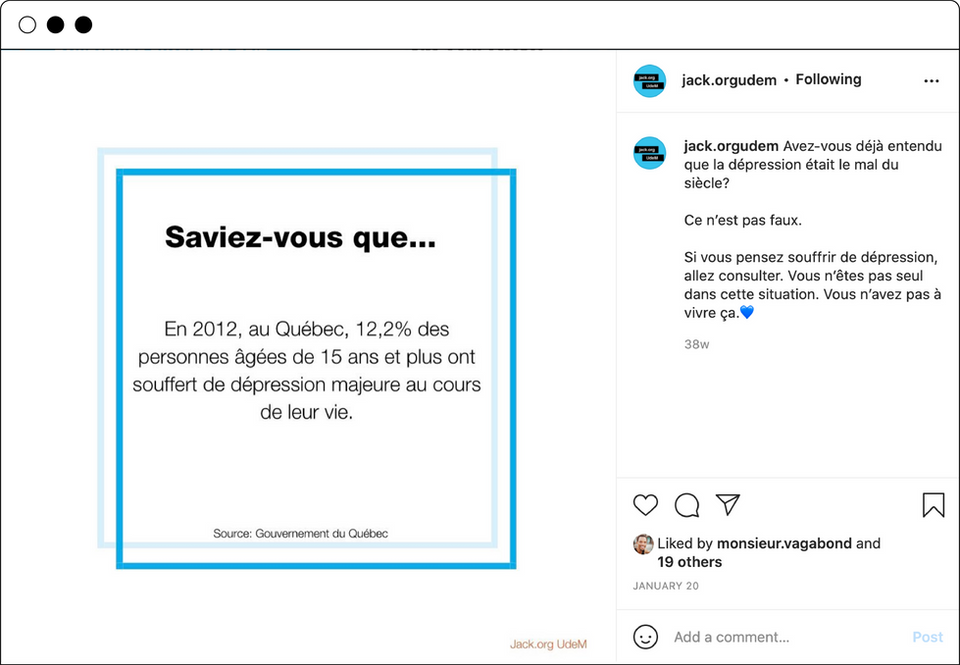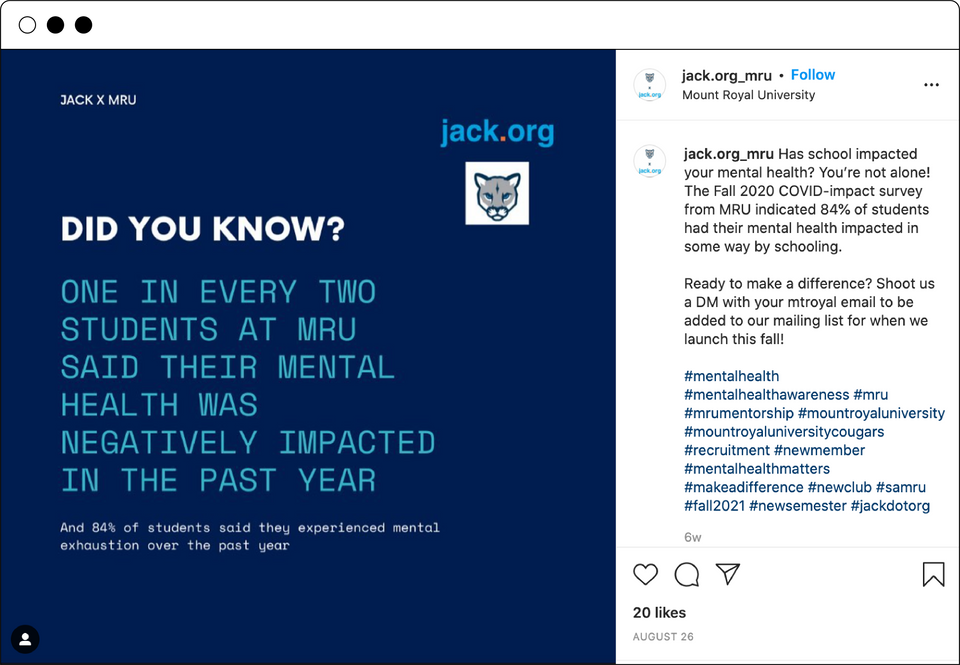
2021
annual report

A Message from Eric
Founder & Executive Director, Jack.org

Dear friends and supporters of Jack.org,
In 2010, with the support of our closest friends, my wife Sandra Hanington and I started an initiative that would evolve into the national charity Jack.org. We wanted to redirect our grief from the loss of our son Jack to suicide and respond to a very clear need. Our hope was to help ensure that all young people in Canada have access to the mental health education and support they deserve. Eleven years later, the current context has demonstrated that the need for this work has never been greater.
Being stuck at home, unable to go to school or see friends, restricted from their usual activities ... of course all these things have had an impact on young people’s mental health, especially on those who are already struggling. In Ottawa, 30% more youth are accessing counselling and addiction services. Meanwhile, research from BC shows that two-thirds of youth in the province reported having mood swings, anxiety or suicidal thoughts during the pandemic, up from one-third before the pandemic.
Our wonderful supporters truly understood the need to support youth mental health, especially during this time, and they stepped up. Through spontaneous gifts, increased monthly donations, an incredible Jack Ride, and numerous DIY fundraising events, our supporters’ incredible generosity has exceeded our wildest expectations.
At a time when many organizations were forced to downsize, our donors’ generosity has enabled us to expand our programming through digital execution, helping us reach, educate, train and empower more young people than ever, all across the country.
Meanwhile, our focus on impact continues to deepen. We’re growing our understanding of how youth who identify as BIPOC, newcomers to Canada, members of the LGBTQ2S+ community, and other equity-seeking communities experience mental health struggle and care. The fact that these communities are at higher risk of mental health struggle and are typically underserved when it comes to services. We’ve taken meaningful steps in our commitment to equity, diversity and inclusion by amplifying their voices, providing more inclusive programming, and empowering our young volunteers to advocate for more accessible and appropriate mental health supports.
Despite this, we know that the youth mental health crisis brings relentless pressures. It’s been a long journey, but we remain undivided in our efforts to help our young leaders, the protagonists of our story. Youth will be “front and centre,” and drive our mission forward everyday, and dismantle current and emerging barriers to positive mental health for youth across Canada.
To all of our supporters: thank you for recognizing the importance of youth mental health, for standing with our staff and vast network of young leaders, for helping them grow, and for helping the team at Jack.org empower them and elevate their voices.
Sending my endless love and gratitude.

Eric Windeler, M.S.C.
Founder & Executive Director, Jack.org
2020-21
The Network Rep program empowers 13 young leaders across Canada to represent their region as part of their contribution to Jack.org. They work closely with the staff team to ensure youth perspectives are reflected in our work, while lending their voices to program design and speaking on behalf of their peers in events and media across the country. Just a few of their contributions are listed here:
Windsor, ON
Abby Lee Hallet
Shared her story on the Image Ideals episode of Unmute, our podcast.
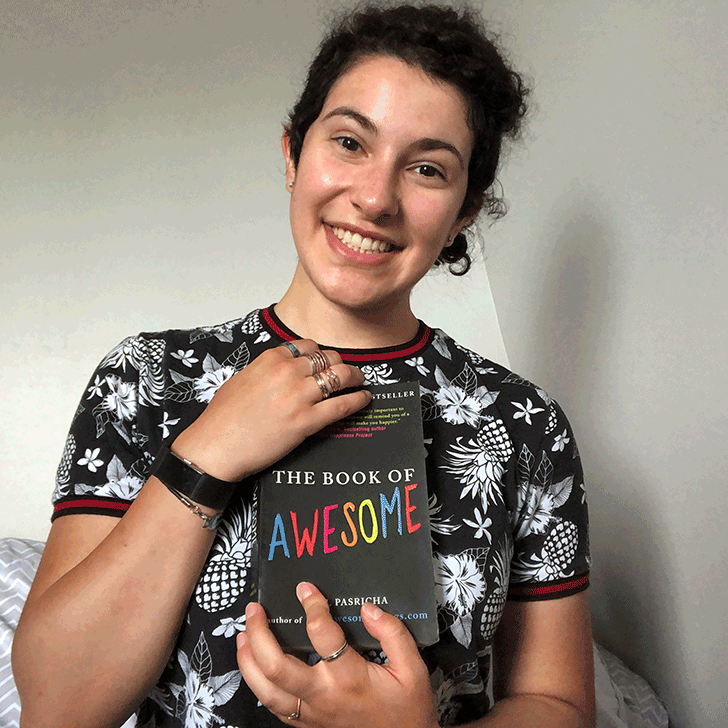
Toronto, ON
Aswani Siwakoti
Played a critical role in Jack.org’s Spring Giving Campaign and co-hosted a discussion on climate anxiety for Bell Let’s Talk.
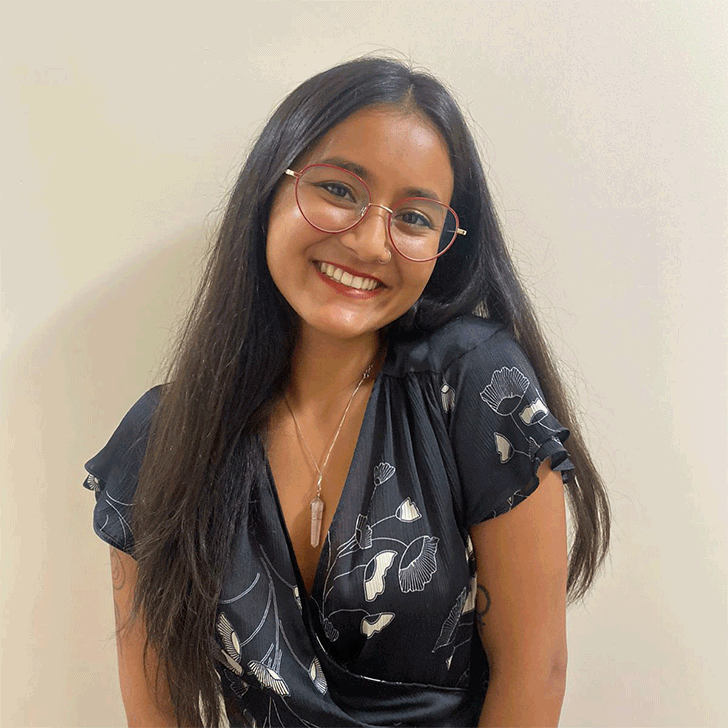
Saskatoon, SK
Emily Sather
Spearheaded the development of Lost and Found, an initiative inviting people to share their stories of things they lost and new things they found or discovered in 2020.

Surrey, BC
Jay Legaspi
Shared his story in our Untold documentary series, and appeared in the video promoting the Get Smart(er) initiative
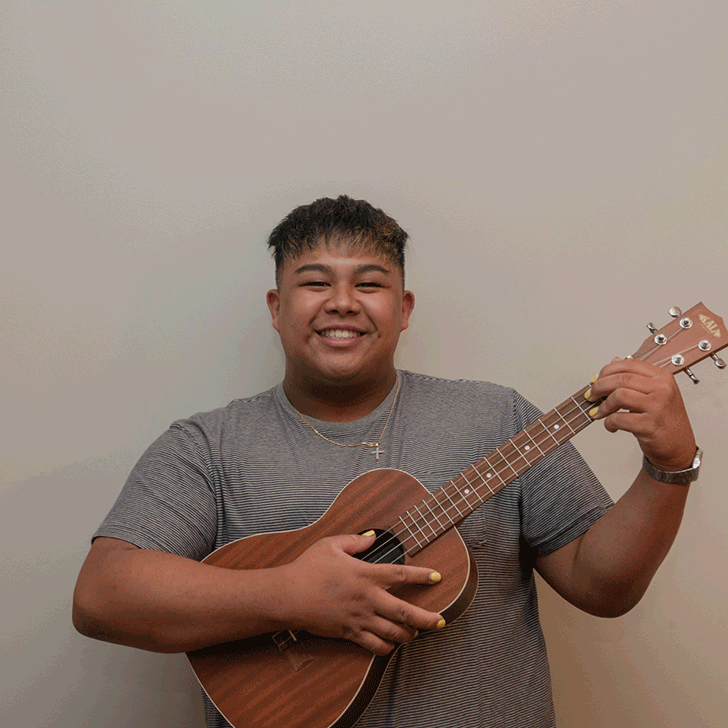
Fredericton, NB
Patrice Cammarano
Participated in a roundtable on men’s mental health for Unmute, and shared his experience of the eating disorder orthorexia on the Stories section of our website.

Woodbridge, ON
Sadia Fazelyar
Co-hosted our first-ever national live-streamed Jack Talk with Jonathan Andrews, which was presented in partnership with Bell Let’s Talk.

Edmonton, AB
Teresa Chen
Co-hosted a discussion on culture, identity, and mental health with Abbey Lee Hallett.

Montréal, QC
Alexandra Radu
Hosted the annual UdeM marathon (virtually), raising $3312, and helped organize MTL au Sommet in 2020.

Halifax, NS
Clayton Murphy
Contributed to Do Something initiatives, worked on bringing chapters to rural Nova Scotia through outreach, and helped organize the 2020 Atlantic Jack Summit.

Gatineau, QC
Ezechiel Nana
Interviewed Deputy Chief Public Health Officer Howard Njoo in French for Do Something/Fait de Quoi and shared the story of his mental health journey in our Untold documentary series.

Whitehorse, YT
Paige Savard
Mentored the Yukon University Jack Chapter and helped develop and facilitate the Northern Jack Summit.

Summerside, PE
Rachel Adams
Played a key part in the organization and execution of the Atlantic Summit.

Iqaluit, NU
Sope Owoaje
Highlighted the need for more equitable internet access across Canada in our Youth Voice Report 2020.

Our Network Representatives
Youth Network Advisors
Making an Impact in the Jack.org Boardroom


Back in 2019, Jess Fazio and Dan Derkach became Jack.org’s inaugural Youth Network Advisors (formerly known as Network Liaisons). Jess and Dan piloted the Youth Network Advisor role and represented over 3,000 young leaders at the board level. They attended board meetings, ensured that youth voices were at the core of decision-making, and created greater transparency between the board and the Network Reps and the youth they represent.
Jess and Dan also helped to define the role and responsibilities of future Youth Network Advisors.
Here are just some examples of what they did in 2020-21:
-
They gathered feedback on our transition to virtual programs and events from Network Reps and youth within our network and helped us apply that feedback to the planning of Virtual Jack Summits in 2020-21.
-
They provided advice on how video documentaries, podcasts, and other stories shared by Jack.org can be regularly used as conversation starters related to various topics around mental health, rather than be simply used as one-off marketing materials.
-
They shared the perspectives of our Network Reps and our youth network on national and global issues such as systemic racism and advising on how Jack.org can use its social channels to better respond to these issues.
We’re so grateful to Jess and Dan for piloting and shaping this role for the past two years. We look forward to working with our new Youth Network Advisors Sope Owoaje (from Iqaluit, Nunavut) and Clayton Murphy (from Halifax, N.S.) in the next fiscal year.

The Path to Equal Outcomes
A Note on Equity, Diversity, and Inclusion
After the start of many long-overdue conversations in 2020, we have been reflecting on how best to continue our approach to equity, diversity and inclusion. Over the past year, our goal has been to create a culture of belonging while “doing the most good” internally and externally, across all channels.
We continue to work on amplifying the voices of equity-seeking communities in our network while also committing to greater representation of all racialized youth. We've adopted a strength-based approach to storytelling. For example, our new Jack Originals content is committed to authentic representation that does not tokenize nor focus on the trauma of equity-seeking communities. We have also created new relationships to collaborate with organizations doing incredible work in these spaces.
We’ve also been taking steps to address equity gaps in our content and programs. In August 2020, we conducted equity reviews of each program and drafted action plan recommendations. In November 2020, we conducted a culture audit and interviewed all staff members and began developing our principles and values work. We also conducted equity education and training sessions for all employees from March to May 2021. In our day-to-day work, we continue to elevate the voices of equity-seeking groups, provide more inclusive programming, and advocate for more accessible and culturally appropriate mental health support. Tangible innovation in our programming is underway and will roll out throughout the next fiscal year.
Our engagement in linguistic equity aims to serve francophone youth and stakeholders with the same level of excellence we do their anglophone counterparts. To do so, we've increased francophone capacity on our staff, including three staff based in Quebec, as well as furthering our bilingual programs offerings, such as the Virtual Jack Talk. Empathy, systemic linguistic equity and cultural alignment have guided our efforts to build meaningful relationships and make a lasting impact among Canada’s francophone communities. While we continue to move towards true bilingualism, we are also working on creating original content that is culturally relevant to diverse francophone communities.
What comes next? We continue to hold ourselves accountable to learning and creating more inclusive and equitable programs. We plan to publish our Equity, Diversity and Inclusion commitments in the next fiscal year, so that we are able to increase transparency around our equity work and hold ourselves accountable. And we continue to be humble and cognizant of the remaining work we need to do to ensure that we build a stronger, more inclusive community, today and always.

Our programs
Growing Under Pressure
For Jack.org and youth across Canada, pressure from the pandemic came in many forms – from the need to keep innovating and advocating amid uncertainty to adjusting to constantly changing rules while staying on track.
To face these pressures, we quickly adapted three of our globally recognized programs – Jack Talks, Jack Chapters, and Jack Summits. We also grew our existing virtual activities, keeping our community connected and continuing our conversations about equity at a time of increased focus on mental health.

Our Programs:
Jack Talks
The Jack Talks program uses the known benefits and effectiveness of peer-to-peer education to empower youth changemakers to educate their peers safely and hopefully about mental health.
Our supporters enabled us to rapidly pivot to a virtual model of Jack Talks when the pandemic began, piloting three versions of the Virtual Jack Talk to continue providing peer-to-peer mental health presentations to young people across the country. The Pre-Recorded Edition is designed to be facilitated by an educator in a classroom or group setting. Registrants are provided with a professionally-filmed Jack Talk, a discussion guide, facilitation activities and quizzes, and guidance from trained Jack.org staff. The Livestream Edition is delivered in real time by two trained Jack Talks speakers using video conferencing software. The pre-recorded Personal Edition gives users access to a professionally recorded Virtual Jack Talk on their own time and allows them to complete the activities at their own pace.
In our efforts to pursue linguistic equity, we have delivered 28 French Jack Talks in British Columbia, Ontario, Prince Edward Island, and Quebec since November 2020. We’re also moving forward with new programming to better support Indigenous communities and have piloted shorter versions of a Virtual Jack Talk followed by a presentation from an Elder. So far, feedback on these pilots has been positive. After we presented one such pilot to 36 Albertans, 100% of participants told us it was important to them to have an Elder present.
What we did
752
Virtual Jack Talks were delivered for
free to
26,966
participants across Canada.
104
Jack Talks Speakers Trained.
How it made a difference
71%
of audience members feel better able to support a friend with their mental health.
73%
of audience members say they know where to get help for their mental health if they need it (an increase of 5% from before the Talk) by giving them the tools they need to identify and dismantle mental health barriers in their communities.

Our Programs:
Jack Chapters
To assist Jack Chapters in such a difficult year, our staff provided digital resources, coaching around online advocacy, and mentorship to make sure each Chapter had the support they needed. Through 22 virtual Chapter meet-ups, we also created a space where Chapter leaders from across Canada could hang out, share ideas and discuss challenges they face.
We also helped youth leaders at 10 post-secondary Jack Chapters complete the Campus Assessment Tool (CAT), which helped them collect valuable information about available mental health services at their schools and to establish dialogue with decision-makers on their campuses. This work will underpin Jack.org’s support of the systems change advocacy efforts of our young leaders.
On May 5, 2021, we held a Day of Collective Action (DOCA) for Jack Chapters to help them feel more connected to the national network. Suggested activities for Chapters included making and distributing wellness kits, writing letters to local decision-makers and even creating an old-school pen pal program! These initiatives helped to build momentum among Jack Chapters across the country and gave our incredible Chapter leaders the opportunity to share ideas and cheer one another on.
We’re so thankful to all of our Jack Chapter leaders, who showed immense strength against considerable odds this past year. We also extend our gratitude to our donors, who supported the Jack Chapters and these young advocates.
What we did
195
active Jack Chapters supported
1,920
young leaders supported to organize
2,468
mental health initiatives that sparked
79,000+
meaningful engagements across Canada.
How it made a difference
After participating in the Jack Chapters program,
92%
of Chapter leaders say they’re comfortable with starting a mental health conversation with an acquaintance in school (71% before participating).
93%
of Chapter leaders say they’re confident that they can identify mental health barriers in their community (an increase of 12% from the beginning of the year).
84%
of Chapter leaders say they feel confident that they can take action to address these barriers in their community (an increase of 19% from the beginning of the year).

Our Programs:
Jack Summits
Jack Summits bring young changemakers together at the local, regional, and national levels to receive training, collaborate, empower, and learn from one another. This year, we hosted 21 safe, fun, and engaging Jack Summits at the local, regional and national level.
Virtual Local Jack Summits
This year, we helped young people organize 14 Virtual Local Jack Summits in communities across British Columbia, Manitoba, Ontario, Quebec, and Newfoundland. These Summits were focused on the unique needs of each community, while facilitating discussions on more universal topics like preventing digital burnout and using social media in positive ways. All topics are related to the mental health and wellbeing of youth.
Virtual Regional Jack Summits
Six Virtual Regional Jack Summits engaged youth in British Columbia, the Northern Territories, the Prairies, Ontario, the Maritimes and Francophone Canada. Attendees explored wide-ranging regional and national topics such as diversity in mental health, social media advocacy, self-care, culturally relevant resources, and continuous care.
“Undivided” – A Virtual National Jack Summit
Working with our 13 Network Reps, we planned Undivided, the 2021 Virtual National Jack Summit from March 17 to 21, 2021. The theme they came up with was spot on! Despite the pressure of the pandemic, our network remains undivided in our common goal to make youth mental health an urgent national priority.
Kicking off with amazing musical performances, the National Jack Summit saw delegates connecting with each other in workshops, panel discussions, and collaboration sessions to pinpoint regional and national mental health priorities. Summit sessions delved into the intersection of mental health and social justice issues, socio-economic concerns, and the lack of in-human connection and community that young people are feeling.
Delegates also had the opportunity to present their youth mental health priorities to adult allies and decision-makers like The Honourable Patty Hadju, Federal Minister of Health. Speakers and panelists included youth gun control advocate David Hogg, Dr. Saira Sabzaali, a specialist in culturally informed mental health therapy, and a major surprise appearance from Jack.org fan Selena Gomez!
What we did
14
Virtual Local Jack Summits were held with
1,287
delegates.
6
Virtual Regional Jack Summits were held with
200
delegates across the Northern Territories, Atlantic provinces, the Prairies, lower mainland BC, Ontario, and francophone youth.
1
National Jack Summit was held with 141 delegates from all provinces and territories.
How it made a difference
After attending the 2021 National Jack Summit,
98%
of delegates felt confident that they could take action to address mental health needs in their community (an increase of 26% from before the Summit)

Our Programs:
Be There
Be There is an innovative program that helps young people learn about mental health, learn how to support themselves and most importantly, feel confident supporting their peers who may be struggling. Be There was critically important to have in place at the beginning of the pandemic and has continued to resonate with young people throughout this tumultuous time.
Thanks to our supporters, we have been able to continue to enrich BeThere.org with three new videos that showcase the significant and universal impact of the 5 Golden Rules on a range of lived experiences.
To raise awareness of Be There amongst young people, we launched Level Up, a successful outreach campaign executed across social media platforms and other digital media. It included a collaboration with well known TikTok influencers like Jack Innanen who encouraged young people to discover Be There and learn the 5 Golden Rules of supporting someone.
We also used Native Touch for our communications, a platform designated to reach Indigenous communities, which enabled us to acquire over 4,000 new users while reaching nearly one million impressions. This approach gave us the opportunity to get a deeper understanding of the content and messages that Indigenous youth connected to.
Joining forces to reach more youth
We’re so excited to collaborate with partners in the youth mental health space to promote BeThere.org as an essential resource for young people.Through our #BeKindBeThere social media campaign with our friends at Lady Gaga’s Born This Way Foundation, we brought Be There to even more youth across North America.
We also worked hand in hand with Tim Hortons Foundation Camps to deliver customized Be There workshops in French and English to camp staff, starting in spring 2021. Thanks to this partnership, our trained speakers shared important mental health knowledge with over 5,000 campers already engaged in a rigorous strength-based learning model attuned to the specific needs of the youth Tims Camps serves. Now, these 5,000 new allies know how to recognize when someone might be struggling with their mental health, their role in supporting that person, and how to connect them to the help they need.
We’re also celebrating the progress made in education and sports thanks to the collaboration of School Mental Health Ontario and HeadCheck Health. School Mental Health Ontario has integrated Be There materials into Student Mental Health in Action lesson plans. HeadCheck Health, an organization that enables its youth and sports organizations to prevent head injuries and support athlete recovery, listed Be There among the resources it recommends for the 800 sports leagues across North America that they work with.
What we did
Since July 2020,
396,000+
new unique users visited BeThere.org, including
70,702
visitors to ÊtreLà.org, the French version of Be There.
How it made a difference
According to people who used Be There,
81%
say they have increased confidence in their ability to support others (an increase of 19% from before using the resource)
82%
say they would recommend Be There to a friend.

Our Programs:
The 2020 Youth Voice Report
Jack.org's 2020 Youth Voice Report provides youth-informed guidance to post-secondary administrators, policy-makers, and other adult allies who do their part to improve Canada’s youth mental health system.
CONTRIBUTORS
We reached out to our youth network to understand their experiences and perceptions regarding mental health in Canada. 1,107 young people in every province and territory took part in a series of carefully coordinated surveys, interviews and other assessment tools.
THEIR BIGGEST CHALLENGES
-
Academic Stress
94% of post-secondary survey respondents told us that academic stress creates mental health struggles for them and their peers.
-
Uncertainty about Digital Mental Health Services
Youth recognize the need to enhance digital mental health care but are unsure about how effective it can be for them. Only 37% of respondents reported using such services during the pandemic when they were surveyed in May 2020.
-
Difficulty finding the right fit
61% of respondents believe there are few resources to support those struggling with their mental health in their community. 65% believe there is a lack of culturally appropriate resources available.
THEIR RECOMMENDATIONS
-
Encourage the use of teaching practices that support student well-being:
Mental health breaks, flexible grading dialogue and other solutions highlighted in the report can go a long way to helping student mental health.
-
Help young people access and navigate online mental health services:
Involve youth in the development of services, communicate clearly about available services, look to digital services as a component of the suite of options, but be sure to consider inequities in internet access.
-
Increase the availability of culturally appropriate mental health services:
Improve access to a wider scope of culturally appropriate resources, involve diverse voices when developing and making decisions about resources, consider investing in community-based mental health emergency responders in lieu of police.

Development

Development:
Jack Ride
As Canada’s largest cycling event for youth mental health, Jack Ride has built a passionate community of cyclists and donors that has raised millions for Jack.org’s crucial programs across the country since 2010. While we once again held an entirely virtual event, Jack Ride 2021 ultimately proved to be our most successful Ride yet.
With the experience of Jack Ride 2020 under our belts, the virtual format allowed us to set our sights on expanding participation beyond Ontario and encouraging multiple ways for riders to participate, such as running, hiking and rowing. We also improved accessibility for youth participants by offering a new option for riders to sponsor a youth rider. As a result, youth accounted for 18% of all riders this year.
Ultimately, 1,585 riders on 129 teams, including 900 first-time participants, joined us from 191 cities, 7 Canadian provinces, and 4 countries. This represents a 45% increase in participation, a 33% increase in the number of teams, a 91% increase in the number of donations, and a 58% increase in the total amount raised compared to 2020.
While our goal was to raise $1,000,000, our riders and their supporters helped us raise an unprecedented $2,083,553. For the month of May 2021 alone, donors and riders raised $1,121,818. Our Jack Ride community showed up like never before, and because of this support we doubled our goal and were able to pivot these supplementary funds to expanding our digital programs at a time when youth needed them the most.
129
teams
1,585
Riders
89.4%
respondents said they rode because of the cause
9.25/10
Rider experience
13,527
donations and
$2,083,553 raised
100% of which goes directly to support young leaders across Jack.org’s programs.

Development:
Community Fundraising
The success of our major fundraising events like Jack Ride would not have been possible without some special individuals who do-it-themselves when it comes to fundraising.
Starting on January 1, 2021, Ali Soheil began his 90 Days of Hope fundraiser, where he cycled through the winter every day for 90 days for youth mental health. Riding in freezing temperatures, snow, rain and sunshine, he ultimately raised hope almost $23,000 for Jack.org.
Our DIY fundraisers never fail to inspire us with their passion for youth mental health. From July 2020 to June 2021, 117 individual fundraisers raised over $300,000 for Jack.org.
We can’t emphasize how much their commitment to the cause, as well as their creative awareness and fundraising events mean to us. It's because of this support that Jack.org has been able to continue to adapt and grow our programs in a year of continued change and uncertainty.

Meaningful Interactions

Meaningful Interactions:
Community
This year, staying connected through our online community was more important than ever before. This connection is a powerful tool for our youth mental health movement, and we used it to share resources and education, stories from our network, and to check in on one another.
This year, we also made an effort to increase the level of direct engagement across our platforms by surveying our network’s thoughts and opinions on our content, and checking in to make sure we continue sharing information that is relevant and important to youth. We even joined TikTok, as a trending platform where we can find and reach more youth.
Our paid and organic social media publications received over 37 million impressions and over 588,000 engagements from people around the world. And 7,386 new people followed and joined us in the conversation around youth mental health. This translates to millions of opportunities for continued education, awareness-building and new conversations around youth mental health.
We can’t wait to keep learning, connecting and growing our ability to help more youth with your support.

Meaningful Interactions:
Support
Enabling Peer to peer support with Responsive Resources
In the early days of the pandemic, our assignment was clear. What our network needed most was practical guidance on support and educating their peers on youth mental health in the midst of uncertain and tumultuous times.
As life online became the new normal, we knew it was critical to continue providing digital resources for education and support that were easily accessible for all young people. This year we built six new resource pages to help young people get the support they need, when they need it, no matter their circumstances and lived experiences.
We collaborated with the Alberta government and Kids Help Phone to launch the Alberta COVID-19 Youth Mental Health Resource Hub, featuring resources designed with youth in mind and covering topics including how to support positive mental health and how to be there for yourself and others.
Along with the launch of our Jack Originals series, we published a list of Men’s Mental Health Resources for those who are seeking help or looking to support the men in their lives.
In the wake of George Floyd’s tragic death, the #BlackLivesMatter and #StopAsianHate movements, and the discovery of the remains of thousands of Indigenous children found at the former residential school sites across the country, we responded. We chose to lend our platform to incredible community organizations working in the mental health space and to share resources to support these communities. Out of a commitment to supporting all young people in ways that are culturally appropriate and representative of their collective and individual experiences, we created our Anti-racism resources, Asian mental health resources and Indigenous mental health resources pages.
In summary, this year staying connected through our online community was more important than ever before. This connection is a powerful tool for our movement, and we used it to share resources and education, stories from our network, and to check in on one another.

Meaningful Interactions:
Storytelling
The Growing Power of a Single Story
In the fall of 2020, we conducted a landscape scan to identify themes that were top of mind for our youth network and that were historically underrepresented in mainstream media. What followed was the development of a multidisciplinary content platform called Jack Originals. Jack Originals’ emphasis on storytelling makes space for conversations and education about mental health topics that are global yet deeply personal.
We developed a documentary series, Untold, to discuss under-represented and stigmatized mental health issues, the cultural and systemic obstacles youth face when pursuing better mental health, and the potential for real solutions in their lifetime. Since October, we’ve taken an in-depth look at men’s mental health and body image and eating disorders via different media, including audio, video and written content. We also produced two stand-alone stories in our Untold series, featuring network member Chelsea Cuffaro to mark Borderline Personality Disorder Awareness month in May, and Network Representative Jay Legaspi to mark Pride month in June.
Our approach has been to combine storytelling, rigorous research and collaboration to create engaging content.
11,000+
digital interactions
2,100+
Instagram saves
206,000+
people reached

FY2021
Audited Financial Statements
When the COVID-19 pandemic hit, we were uncertain about what the pandemic would mean for fundraising. Therefore, we were cautious with the revenue goals we set for the year. Nevertheless, it has become clear that our wonderful supporters truly understand the need to support youth mental health, especially during this time. As just one example, through our virtual Jack Ride, our supporters helped us raise almost $2.1 million – up from last year’s record total of $1.3 million. With 1,585 riders and over 13,500 donations, it was such an incredible event. We’re so grateful.
Growing Under Pressure
After receiving such amazing support, we immediately began investing this revenue surplus in areas where it was needed most. At a time when many organizations were forced to downsize, donor support enabled us to hire 15 bright, passionate individuals across Canada. Now 64-strong, our staff team supports over 3,000 young changemakers who volunteer in Jack.org’s programs in every province and territory. Our peer-to-peer mental health education approach is based on strong evidence, and we see its impact daily. Going forward, we will continue to invest donor funds to reach more youth and deepen the impact of our programs.

Grow with Us
It’s clear that youth mental health is trending. Here are ways you can contribute and learn more about our work.
Our Funders
Transformational Partners


Lead Jack Ride Sponsor
Lead Be There Sponsor

Lead Ontario Jack Talks Partner

Lead Jack Chapters Partner

Champions

Program Partners
Jack.org is supported by the Government of Canada’s Emergency Community Support Fund and the Community Foundation of Nova Scotia, Toronto Foundation, Edmonton Community Foundation and Community Foundation of Mississauga.

Event Sponsors

